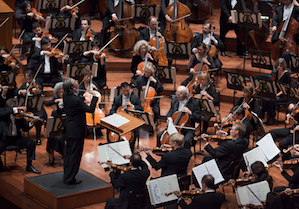
Two weeks after word about a tentative collective bargaining agreement between San Francisco Symphony and Musicians Union, Local 6, AFM, the two sides announced ratification of a 26-month contract. Apparently, several items had to be renegotiated before the contract was accepted.
There is now official agreement that the crisis - which at its worst resulted in an 18-day strike — is over, but the war of words continues, especially from the musicians' representatives.
Between contrasting interpretations of the agreement, these are the facts, stated in the announcement with minimal specificity:
* The musicians' minimum base salary will be increased beginning in September by 4 1/2% over the life of the contract, from the current annual $141,700 to $148,200.
The management announcement provided weekly figures, probably in response to some public comments about the size of salaries; the musicians' statement referred only to the percentage. The original negotiation stance pitched a 2% salary increase offer against the musicians' 15% demand.
* Provision for 10 weeks of paid vacation continues.
* The size of the orchestra increased from 103 to 106 members
* Substitutes and extras will continue to receive equal pay, the musicians say "fighting back against the creation of a tiered work force where some workers are paid less for doing the same job." No comment from management.
* It's unclear how a key issue, medical insurance, was settled, but against the previous premium-free provision, some of the musicians now will have to contribute.

The union statement says it "saved the medical plan that three quarters of the musicians are enrolled in ... but they must pay more out of pocket costs for the plan." It is unknown if the reference is to premiums or copayments, the latter being part of virtually every employer-provided medical insurance.
* In the matter of contested work rules, never specified by each side, the musicians say they agreed to "minimal changes in working conditions that would have had musicians working harder for less money." * The maximum $74,000 annual pension upon retirement will continue, the musicians saying they "beat back proposals to change retirement age from 62 to 65," but accepting no increase in the amount of the benefits.
* There are unspecified improvements in the instrument loan, and a reference to "commitment from management to encourage donors to buy fine instruments to be loaned to musicians," something that might not have been in doubt in the first place. Management has provided information about the bargaining process:
The orchestra’s negotiating committee was chaired by David Gaudry and included Rob Weir, Cathy Payne, Linda Lukas, and Nanci Severance. Also participating was David Schoenbrun, President of Musicians’ Union Local No. 6 of the American Federation of Musicians. Susan Martin of Martin and Bonnett acted as counsel to the musicians. Negotiating for the SFS administration were Executive Director Brent Assink, General Manager John Kieser, Human Resources Director Ken Auletta, Chief Financial Officer James Kirk, Orchestra Personnel Manager Rebecca Blum, and attorney Curt Kirschner of Jones Day.
Assink said the agreement "recognizes the immense talents and dedication of our musicians and underscores our commitment to their well-being on every level," he thanked Gaudry and the musicians' negotiating team, and "most of all, I deeply appreciate the patience and ongoing support of our Bay Area community, touring partners, and fans around the country during the past few weeks."
On the musicians' website, Gaudry welcomed the opportunity "to be bringing our music back to the stage at Davies Symphony Hall," and he too expressed regret about the inconvenience the work stoppage has caused the public." He claimed the strike action helped to avoid "deep cuts and freezes and the concept of a 'net-savings' contract, despite the financial health of the organization. It was not until we went on strike that we were able to achieve a settlement that did not move us too far backwards in terms of wages and benefits." Payne, a member of the negotiating committee, spoke after reaching the agreement in terms similar to the musicians' statements explaining the strike action:
In light of the freewheeling spending on management's part, the musicians cannot understand why they were asked to take a wage freeze, a pension freeze, and cuts to our medical plan. We became concerned over the course of this negotiation that management had lost sight of its mission of artistic excellence. The musicians bring the music to life for our community, but our agreement does not allow us to keep up with the Bay Area's high cost of living."
As a parting shot, Gaudry said:
The musicians on the Negotiating Committee were dedicated to reaching an agreement and yet SFS Executive Director Brent Assink never attended a meeting until we were actually on strike. Some of the members of the management bargaining team were inexperienced and at times incompetent. They wasted hundreds of hours of our time.
Symphony Board President Sakurako Fisher said:
This agreement represents a significant amount of collaboration and a recognition that only a shared vision and a true partnership will propel our outstanding 100-year-old orchestra toward an even greater future. We remain deeply gratified by our community’s exceptional commitment to our orchestra and to the arts.
